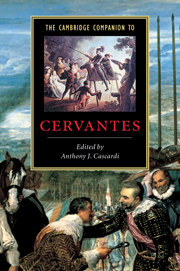Book contents
- Frontmatter
- 1 Introduction
- 2 The historical and social context
- 3 Cervantes and the Italian Renaissance
- 4 Don Quixote and the invention of the novel
- 5 The influence of Cervantes
- 6 Cervantes’ other fiction
- 7 Writings for the stage
- 8 Humor and violence in Cervantes
- 9 Psyche and gender in Cervantes
- 10 Cervantes and the New World
- Appendix: electronic editions and scholarly resources
- Index
- Series List
8 - Humor and violence in Cervantes
Published online by Cambridge University Press: 28 May 2006
- Frontmatter
- 1 Introduction
- 2 The historical and social context
- 3 Cervantes and the Italian Renaissance
- 4 Don Quixote and the invention of the novel
- 5 The influence of Cervantes
- 6 Cervantes’ other fiction
- 7 Writings for the stage
- 8 Humor and violence in Cervantes
- 9 Psyche and gender in Cervantes
- 10 Cervantes and the New World
- Appendix: electronic editions and scholarly resources
- Index
- Series List
Summary
In two of his recent books on the canon, The Western Canon and How to Read and Why, Harold Bloom echoes numerous literary historians when he asserts that Cervantes and his contemporary, Shakespeare, occupy the highest eminence as “wisdom writers” and that the Spaniard's Don Quixote is the first and best of all novels. At the same time, Bloom notes that “No two readers ever seem to read the same Don Quixote, and the most distinguished critics have failed to agree on most of the book's fundamental aspects” (The Western Canon, 120). His words allude to the long-standing debate surrounding both authorial intent and readers' reception: is Don Quixote a fundamentally serious, philosophical work, or is it primarily a comedy? While Bloom is historically correct in arguing for Cervantes' novelistic genius, he is, as he himself admits, one of the Romantics who “see Quixote as hero, not fool; decline to read the book primarily as satire; and find in the work a metaphysical or visionary attitude regarding the Don's quest that makes the Cervantine influence upon Moby-Dick seem wholly natural” (The Western Canon, 121). Because of this debate’s continuing relevance both in Cervantine studies and the general history of the novel, any volume exploring the critical tradition surrounding Cervantes’ novelistic genius must address the topic that has critically subsumed many other themes and is of vital structural and thematic importance to Don Quixote: humor. At the same, it is essential to explicate humor’s paradoxical relationship to violence in the novel.
Humor is so fundamental to Cervantes’ conception of prose fiction that he opens his novel with a brief yet unmistakably explicit comic ars poetica. In the prologue the friend offers him the following advice regarding the effect his book should produce in the reader: “ And see, too, if your pages can make sad men laugh as they read, and make smiling men even happier; try to keep simple men untroubled, and wise men impressed by your imagination, and sober men not contemptuous, nor careful men reluctant, to praise it. ”
- Type
- Chapter
- Information
- The Cambridge Companion to Cervantes , pp. 160 - 185Publisher: Cambridge University PressPrint publication year: 2002
- 9
- Cited by

